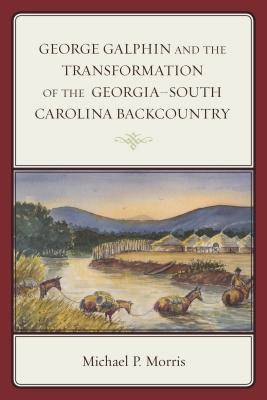
En raison d'une grêve chez bpost, votre commande pourrait être retardée. Vous avez besoin d’un livre rapidement ? Nos magasins vous accueillent à bras ouverts !
- Retrait gratuit dans votre magasin Club
- 7.000.000 titres dans notre catalogue
- Payer en toute sécurité
- Toujours un magasin près de chez vous
En raison de la grêve chez bpost, votre commande pourrait être retardée. Vous avez besoin d’un livre rapidement ? Nos magasins vous accueillent à bras ouverts !
- Retrait gratuit dans votre magasin Club
- 7.000.0000 titres dans notre catalogue
- Payer en toute sécurité
- Toujours un magasin près de chez vous
George Galphin and the Transformation of the Georgia-South Carolina Backcountry
Michael P Morris
110,45 €
+ 220 points
Format
Description
The focus of this work is a reconstruction of the life and career of an Ulster-Scot fur trader, George Galphin (pronounced Golfin), who immigrated to South Carolina in the colonial period. The thesis of this work is that his life and career helped to shape the history of the backcountry of Georgia and South Carolina in three distinct ways. First, his support of a "for profit" Indian trade (as opposed to a "for stability trade") shaped Anglo-Indian relations between frontier settlers and their Indian neighbors. Ultimately, men like Galphin helped the United States move away from the British policy towards Native Americans in favor of a uniquely American policy which ran the gamut from exploitation to land seizures and finally toward Indian Removal itself. The book involves a look at the histories of the Muskogee Creeks and Cherokees who were his clients and has a heavy Native American component.
Galphin's second major influence on the Southeast came with the creation of the Ulster-Scot communities he sponsored in both South Carolina and Georgia. The relocation plans catered strictly to the Scots-Irish Protestants and located them in "danger zones" between coastal settlements of Anglo-Saxon British settlers and the Indian frontiers of the two colonies.
Galphin's third major influence came during the American Revolution when he was appointed as a Patriot Indian Commissioner fighting to control the southeastern tribes and keep them out of the war. In that role, he made his contribution, as did so many others, that helped secure a Patriot victory. This part of his story would be of note to an audience interested in the American Revolution in the South from the perspective of the backcountry.
Finally, his family life included the creation of a large, multi-racial family which helped establish the Creole society of the Eastern Georgia/Western South Carolina. His spouses and children included Caucasians, Native Americans, and African-Americans. Two of Galphin's daughters were his slaves until his death.
Galphin's second major influence on the Southeast came with the creation of the Ulster-Scot communities he sponsored in both South Carolina and Georgia. The relocation plans catered strictly to the Scots-Irish Protestants and located them in "danger zones" between coastal settlements of Anglo-Saxon British settlers and the Indian frontiers of the two colonies.
Galphin's third major influence came during the American Revolution when he was appointed as a Patriot Indian Commissioner fighting to control the southeastern tribes and keep them out of the war. In that role, he made his contribution, as did so many others, that helped secure a Patriot victory. This part of his story would be of note to an audience interested in the American Revolution in the South from the perspective of the backcountry.
Finally, his family life included the creation of a large, multi-racial family which helped establish the Creole society of the Eastern Georgia/Western South Carolina. His spouses and children included Caucasians, Native Americans, and African-Americans. Two of Galphin's daughters were his slaves until his death.
Spécifications
Parties prenantes
- Auteur(s) :
- Editeur:
Contenu
- Nombre de pages :
- 212
- Langue:
- Anglais
- Collection :
Caractéristiques
- EAN:
- 9781498501750
- Date de parution :
- 14-11-16
- Format:
- Livre broché
- Format numérique:
- Trade paperback (VS)
- Dimensions :
- 152 mm x 229 mm
- Poids :
- 272 g

Les avis
Nous publions uniquement les avis qui respectent les conditions requises. Consultez nos conditions pour les avis.






